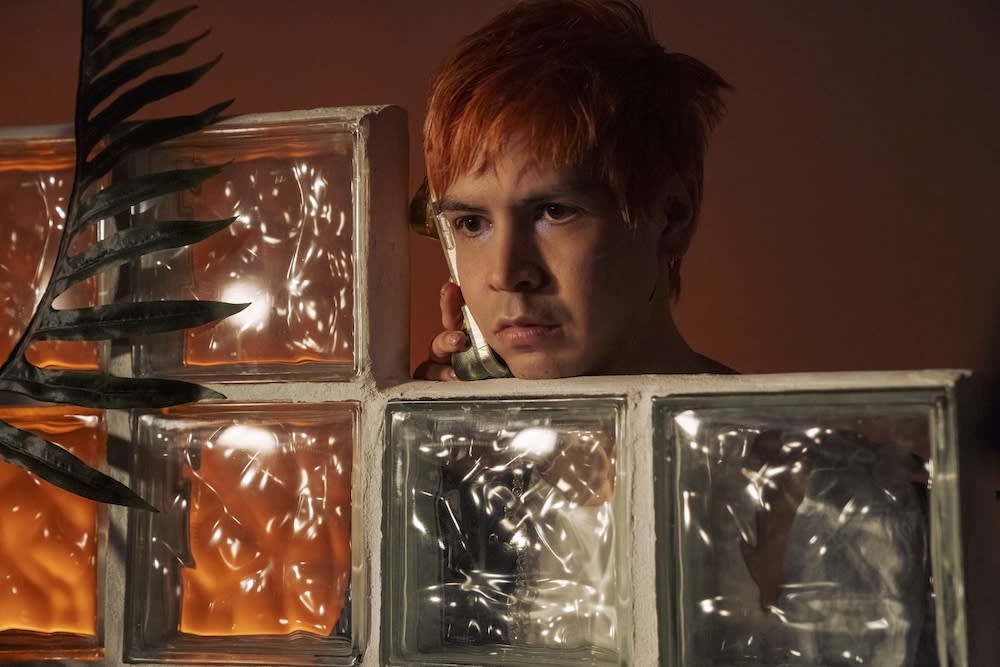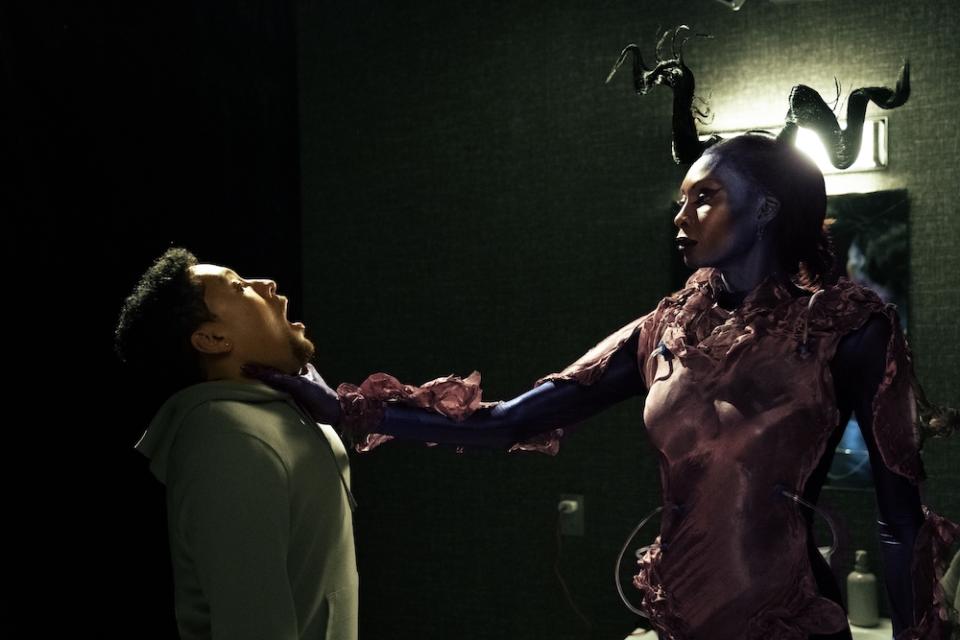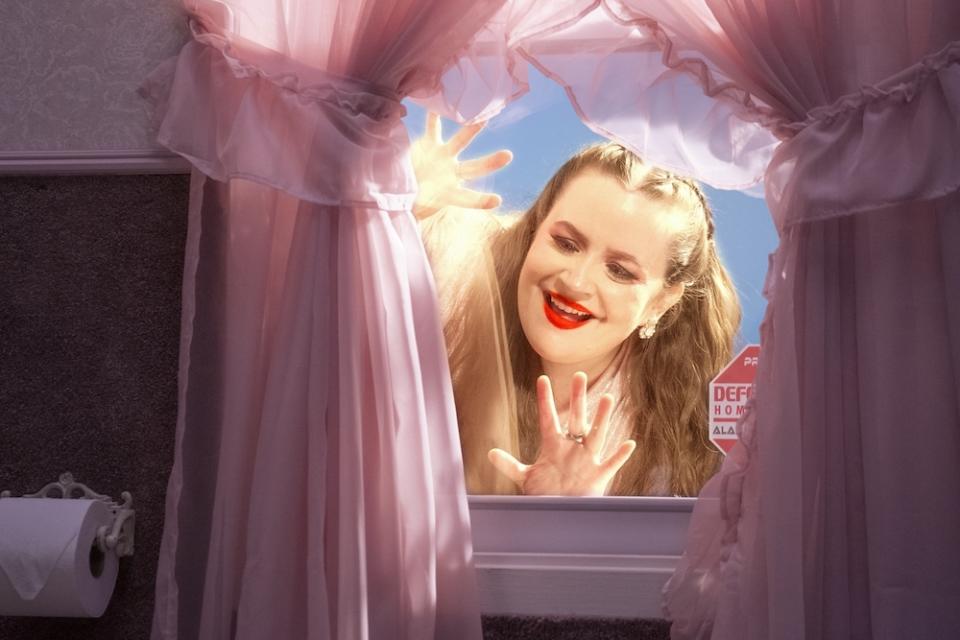‘Fantasmas’ Is Operating on a Level of Brilliance Beyond the Bizarre

- Oops!Something went wrong.Please try again later.
[Editor’s Note: The following article contains light spoilers for “Fantasmas” through Episode 3, “Toilets.”]
Sitting in an office as transparently fake as any late-night talk show set, Julio Torres pitches his idea of Crayola’s next great crayon color: clear. The executives across from him are dubious, even angry at his proposal. “Clear isn’t a color,” one shouts. “If it isn’t a color, what do you call this?” Julio asks, gesturing to absolutely nothing. “Call what?” the suit asks. “The space between us — the emotional space,” Julio says, before waxing poetic (as he has before) about a clear glass of water, clear smells, and the clear memories all around them. “Some things aren’t one of the normal colors,” he says. “They don’t play by the rules of the rainbow. […] To color something clear is to acknowledge that some things are different, and that’s just fine.”
More from IndieWire
'Interview with the Vampire' Just Dropped the Most Audacious TV Episode of the Year
'House of the Dragon' Season 2, Episode 2 Review: The Cost of War
Instantly, a smile spread across my face. “Fantasmas,” from start to finish, conception to execution, is a celebration of the abnormal; of the things that don’t fit in and why each quirk, idiosyncrasy, and distinction should be cherished for its fantastic nonconformity. The flood of foibles in HBO’s half-hour comedy spills over from Julio’s personal proclivities (for a clear crayon or an oyster-shaped earring), to his living situation (a water tower), his personal assistant (a robot named Bibo), his oddball friends (Vanesja is a performance artist who’s been performing as Julio’s agent for so long, she’s also his actual agent), and his day-to-day environment. Dramatic lighting floods every scene, which makes its own nonsensical sense because “Fantasmas” takes place on a soundstage filled with partial walls, screen-printed windows, and projected videos mimicking busy streets or passing cars. That the series (an ideal follow-up to “Los Espookys”) opens in one of Julio’s dreams is no accident. Surreality reigns supreme, from structures to stories.
In a sea of cookie-cutter “content,” “Fantasmas” is a richly designed (and indulgent) quadruple-berry cake, and its existence as the exception to our monster-sized mid-TV glut is exactly what brought me such immediate, irrepressible joy. There’s enough to admire in its fanciful craft and delightful imagination that this review could simply list off each striking facet, one by one, and still serve its basic function as a wholehearted recommendation. But to limit one’s admiration to sheer wonder would be a disservice to the pointed message at the root of Torres’ wild visions. As much as “Fantasmas” rejoices in rampant creativity, it also highlights the nefarious elements in modern society that are trying to kill off any comparable, continuing attempts at eccentricity.
Take Episode 2, “Valued Customer,” when Julio’s mission to find his missing earring introduces a side-plot about an influencer named Skyler (Jaboukie Young-White). Dancing alone in the darkness of his sparsely decorated apartment within the ExxonMobil Residences, Skyler shimmies and shakes for his social media followers. But the second his full-body ring-light goes dark and his camera turns off, so, too, does his overly practiced smile, his face slackening to a static remove. He watches himself — as if feeding from the glow of encouraging comments and cartoon hearts populating his feed — until his phone dies and he has to borrow a charger from his neighbor, thus forcing Skyler to share an actual human interaction.
When he arrives, Gina (played by “Los Espookys” vet Greta Titelman) is weeping in the dark of her own large yet empty apartment. The reason is simple — her husband left her — but the combination of such bountiful emotions and pointed anger overwhelms our little attention addict. He can’t keep up with her complaints, and his buzzword-generated words of support (“this is cancellable stuff”) are quickly dismissed for the irrelevant, uncaring time-fillers they are. That’s when Gina turns on him. She calls out his plan to form a “lifestyle brand,” mocks his fleeting form of superficial popularity, and labels him “a guy who famous people pay to pretend to be their friends, all because they want young people to want them.”
Skyler, it’s clear, does nothing to distinguish himself from the hordes of others like him. He dances like other people dance (well, like other influencers dance). He says what he’s paid to say. His signature “quirk” seems to be slightly sticking out his tongue. He’s so safe he’s practically empty — like his phone battery, like his apartment, and like the mostly blank notebook where he draws bottles of perfume. What those imaginary products would smell like doesn’t seem to matter. What matters is what they look like, which is Skyler’s whole exasperating ethos: He wants to become a lifestyle brand, but he’s got no life and he’s got no style.

The accusation that he’s getting older, his fans are getting older, and there are newer, younger influencers with newer, younger audiences emerging every day proves too much for our tiny dancer. He flees the apartment, buys a new charger, and (after a brief conversation with an encouraging cashier) tries to download the latest, buzziest app, “RealUs.” That’s when she arrives. Emerging from the darkness like a spirit, the Algorithm (Dominique Jackson) eviscerates her prey as quickly and concisely as his meager status demands. “You are but stardust, my dear,” she says. “A drop in gray tides, your skills nontransferable. […] You’re a building block in a never-ending tower.” Her hand around his throat, the scene fades to black. Skyler is no more. The world, or whatever populist pocket of pseudo-reality the internet’s dancing monkeys occupy, has moved on.
Skyler’s bleak arc is just a B-story — a side plot, or even a sketch. Maybe it really happened (in the world of “Fantasmas”), or maybe it only happened in Julio’s imagination. Either way, it shapes his world just as Skyler’s real-world proxies affect our own. The transition shot sees his big-eyed A.I. replacement briefly displayed on Bibo’s torso, shilling something called Dark Water, before the screen flips off and we’re brought back to the A-plot. That savage yet suitable fate is all there is to say about Skyler, but who and what he represents merits a much longer conversation — a conversation about greed’s pervasive grip on society, very much including the ruinous relationship between art and commerce.
“Fantasmas” frames a lot of this discussion in the peripheral, through more supporting characters, many of whom are struggling to survive in the post-apocalyptic American landscape that is late-stage capitalism.
Most noticeable are the victims. The letter Q (beautifully embodied by a mohawked Steve Buscemi) is driven to street performing — and, worse yet, conforming to the more popular letters of the alphabet — when he can’t make a living with his, er, challenging musical style. Dodo the Elf (Bowen Yang) has to sue his employer, Santa Claus, for unfair labor practices that include low pay (if the Christmas spirit even counts as compensation) and abuses of power (like making sex toys for Mrs. Claus, played by Julia Fox).
And then there’s Oscar (Ikechukwu Ufomadu). He runs an internet cafe with his sister, Vicky (Sydnee Washington), but when ordering an ambulance for their father put them in a “substantial amount of debt,” they had to expand into “Mind Upgrading Incorporeal Services” — which sounds like a murder-for-hire swindle that’s somehow more fraudulent — and what Oscar bluntly refers to as “scam calls.” (Vicky dials up random people, including Vanesja, saying “this is the real bank” and asking for money.)
To be fair, Oscar is an idiot. When he called for the very expensive ambulance, his father was just taking a nap. Vicky, however, is a willful predator driven to exploitation by an unfair system. And she’s not alone.

Plenty of the people (and animals) behaving badly in “Fantasmas” are given clear reasons for doing so. Vicky is just trying to pay her family’s exorbitant medical bills. Michael (Jeter Rivera), the school bully who draws sad dicks, only lashes out at other kids because he feels boxed in by gender norms. His teacher, Amina (Eudora Peterson), sees similar frustrations in her boyfriend, who confesses to doing an objectively awful “prank” — he stole a set of keys that locked a woman out of her home — because he was trying to impress his friends (who he had to “beg” to go out) so he could feel better after getting passed over for a promotion.
Among the suffering subjects of “Fantasmas,” cisgendered straight men tend to share similar traits. Some are frustrated, some are stupid, some are both — characteristics that broadly fit a historically privileged group who are (unjustifiably) starting to feel passed over, looked over, or otherwise adrift. At the start of Episode 2, Vanesja remembers seeing the same strange object whenever she hooks up with a dumb bro: an empty Gatorade bottle. Sometimes there were enough to make a “shrine,” sometimes only one, but the pattern became a puzzle. Why collect these empty plastic bottles? What purpose could they serve? “Were they meant to represent possibilities? Potential?” she says. “Perhaps it wasn’t for me to understand. Perhaps their obtuseness was a way of saying, ‘Stay out of this, Vanesja. You have your life, your career, beautiful clothes. We– We have this.”
That “this” is as close to nothing as a physical object can get makes Vanesja’s reverie one of the series’ best jokes. She has it all, and they have their Gatorade bottles. But Julio may soon be left with less. Without a job and with a pending eviction, our protagonist is avoiding big, real problems by focusing on relatively minor side quests. That, in and of itself, says plenty about a generation who’s been forced to accept at a very young age that the earth and everything on it is going to die, but hey, don’t forget to spend half your remaining time working at a job you hate for a corporation that’s largely to blame for your imminent demise.
Distractions are often the only way to avoid spiraling — making our arduous final decades all the more difficult — and for as much as I hope Julio finds a place to live and the means to support himself, I’m also so thankful for the weird, beautiful distractions he provides. They make life worth living, but they may also be our only way to actually live.
Breaking bad habits, avoiding past mistakes, and getting creative in general — these are the paths forward, in the big and small pictures. Differences shouldn’t be seen as things that divide us, but the unique, compelling attributes that could (and do) save us. “Fantasmas” knows this, and it’s feeding it to us like manna from heaven, or an exotic cake in a Costco filled with sugar cookies. With any luck, more TV and films will find ways to escape the industry’s content machine and do the same. And in turn, maybe more people will feel inspired to step outside their own preordained paths; to wake up every day and be a Julio instead of a Skyler.
Not playing by the rules of the rainbow isn’t just silliness for silliness’ sake. It may be the only way to ensure future generations get to see rainbows at all.
“Fantasmas” releases new episodes Fridays at 11 p.m. ET on HBO and Max.
Best of IndieWire
Sign up for Indiewire's Newsletter. For the latest news, follow us on Facebook, Twitter, and Instagram.

